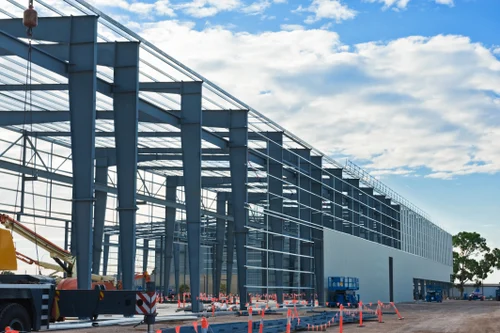In the ever-evolving landscape of industrial infrastructure, the demand for efficient and innovative storage solutions has led to the rise of prefabricated warehouse manufacturers. These companies are changing the game by offering a cost-effective and time-efficient alternative to traditional warehouse construction. In this article, we delve into the world of prefab warehouses, exploring the advantages they bring to the table and shedding light on some prominent manufacturers leading this transformative industry.
I. Prefabricated Warehouses: A Paradigm Shift in Construction
Prefabricated warehouses, also known as prefab warehouses or pre-engineered warehouses, are structures that are manufactured off-site and then transported to the final location for assembly. Unlike conventional warehouses, which are built from scratch on-site, prefabricated warehouses are fabricated in controlled environments, ensuring precision and quality control.
The prefabrication process significantly reduces construction time compared to traditional methods. The components are manufactured simultaneously with site preparation, leading to a streamlined and synchronized construction timeline. This efficiency is particularly advantageous for businesses looking to establish or expand their storage facilities promptly.
II. Advantages of Prefabricated Warehouses
Prefabricated warehouses offer cost advantages at various stages of the construction process. The controlled manufacturing environment reduces material waste, and the assembly process requires fewer labor hours. Additionally, the overall construction time is shorter, leading to cost savings in terms of labor and equipment rental.
Leading prefabricated warehouse manufacturers understand the importance of catering to diverse business needs. These companies provide a range of customization options, allowing clients to design warehouses that meet specific requirements. Whether it’s size, layout, or additional features, prefabricated warehouses can be tailored to suit the unique demands of different industries.
Quality control is a paramount concern in construction, and prefabricated warehouse manufacturers address this by maintaining rigorous standards in their fabrication processes. The use of high-quality materials and precision engineering ensures that these warehouses meet or exceed industry standards. As a result, businesses can rely on the durability and longevity of their storage facilities.
Sustainable Construction Practices
Environmental sustainability is a growing concern in the construction industry. Prefabricated warehouses often incorporate eco-friendly practices, such as the use of recycled materials and energy-efficient design. The controlled manufacturing environment also minimizes the environmental impact of construction activities on-site.
III. Leading Prefabricated Warehouse Manufacturers
ClearSpan Fabric Structures has established itself as a prominent player in the prefabricated warehouse industry. The company is known for its innovative designs and commitment to providing durable, cost-effective, and versatile storage solutions. ClearSpan’s fabric structures are engineered to withstand various weather conditions, making them suitable for a wide range of industries.
Sprung Structures boasts a reputation for creating cutting-edge, tensioned membrane structures. These structures are not only quick to assemble but also offer exceptional flexibility and cost-effectiveness. Sprung’s commitment to sustainability aligns with the growing demand for eco-friendly construction practices in the industrial sector.
Nucor Building Systems is a leader in the design and manufacture of custom-engineered metal buildings. With a focus on innovation and technological advancement, Nucor provides prefabricated warehouses that combine structural integrity with aesthetic appeal. The company’s use of steel ensures durability and resistance to environmental factors.
IV. Case Studies: Success Stories in Prefabricated Warehousing
Amazon, the global e-commerce giant, has embraced prefabricated warehouses in its quest for rapid expansion. The company’s fulfillment centers, vital to its logistics network, often utilize prefabricated structures. This approach allows Amazon to meet growing demand while minimizing construction time, a crucial factor in the competitive e-commerce industry.
Walmart, another retail behemoth, has also turned to prefabricated warehouse solutions for its distribution centers. The ability to customize the size and layout of these warehouses enables Walmart to efficiently manage its vast inventory and optimize logistics operations. Prefabricated warehouses have become an integral part of Walmart’s strategy for enhancing supply chain efficiency.
V. Future Trends and Challenges in Prefabricated Warehousing
The integration of advanced technologies, such as automation and robotics, is poised to revolutionize prefabricated warehouses. Manufacturers are exploring ways to incorporate smart systems that enhance efficiency in inventory management, order fulfillment, and overall warehouse operations.
As the prefabricated warehouse industry continues to evolve, ensuring compliance with local building codes and regulations remains a challenge. Manufacturers must stay abreast of changing standards to provide solutions that meet legal requirements while offering the flexibility and customization clients seek.
VI. Conclusion: Embracing the Future of Warehousing
Prefabricated warehouse manufacturers are reshaping the landscape of industrial construction, offering a compelling alternative to traditional building methods. The advantages of cost-effectiveness, customization, durability, and sustainability position prefabricated warehouses as a key player in meeting the storage needs of diverse industries. As technological advancements and market demands continue to drive innovation in this sector, prefabricated warehouses are likely to play an even more pivotal role in the future of warehousing and logistics. Businesses seeking efficient, scalable, and sustainable storage solutions would do well to explore the offerings of leading prefabricated warehouse manufacturers, propelling their operations into a new era of efficiency and adaptability.

